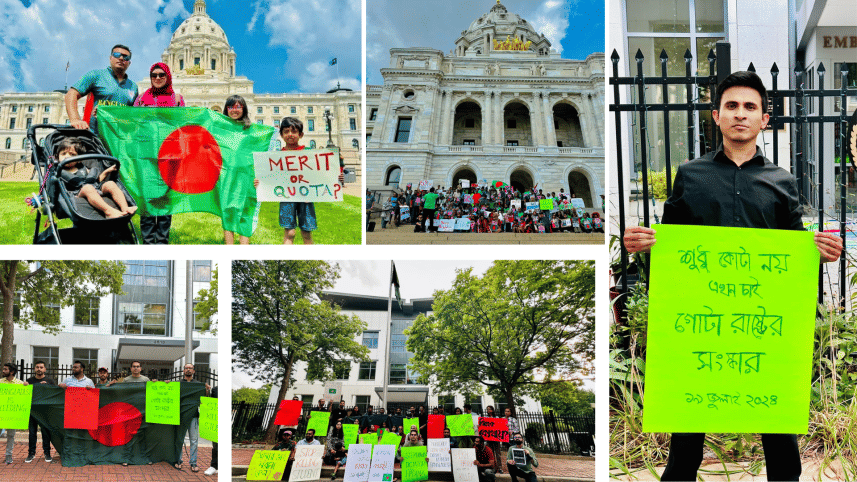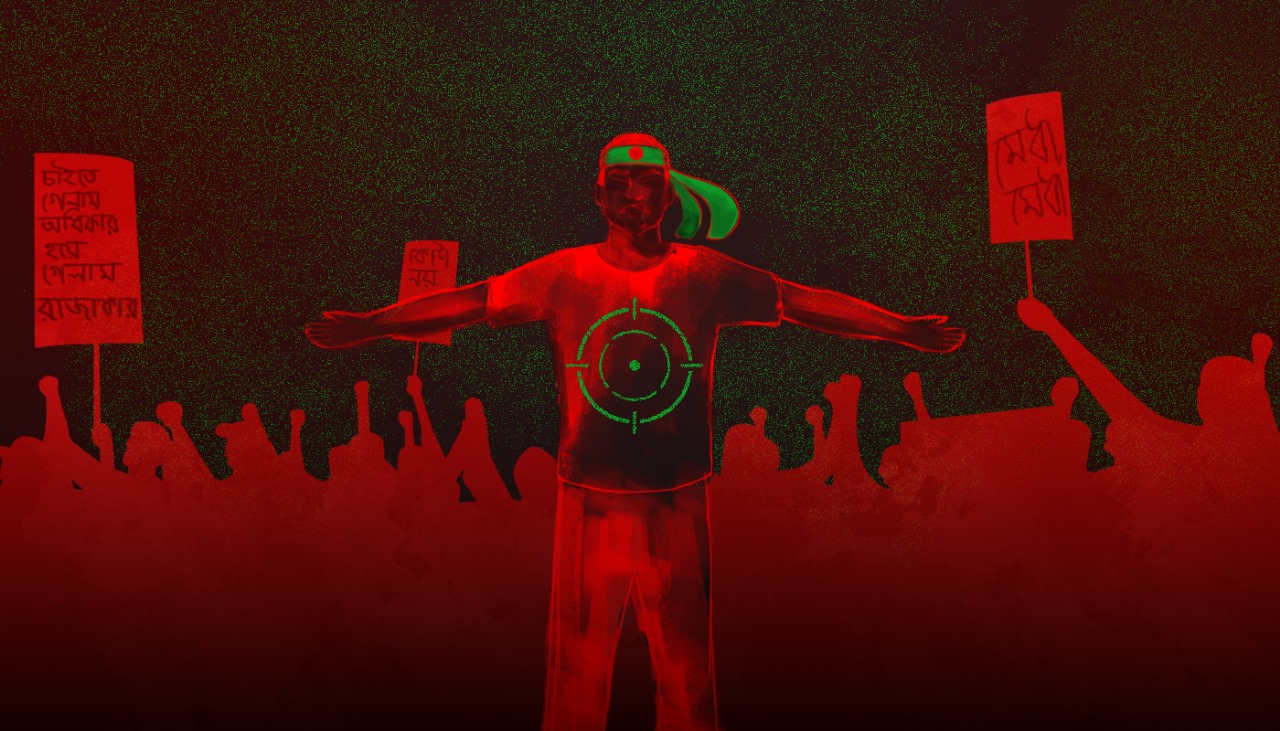Non-resident Bangladeshi voices in the Anti-Discrimination Student Movement

Bangladesh has recently witnessed extraordinary times. In July 2024, what began as a student movement demanding a restructuring of the government job quota system escalated into a countrywide mass movement for equality, justice, and democratic freedom.
The Bangladeshi diaspora spread across the globe also witnessed this historic movement, which led to the overturn of the Sheikh Hasina regime. Hundreds of thousands of non-resident Bangladeshis expressed their solidarity with the student movement; they gathered in front of Bangladesh embassies and high commissions, wrote to their constituents, vowed to stop sending remittances, and voiced their thoughts and views on social media.
"The loss of lives is beyond belief…"
Rashed and Sabriya migrated to Minnesota, USA 10 years ago. Both were raised in Bangladesh and like hundreds of thousands of first-generation Bangladeshi immigrants, every success story of their homeland fills their hearts with pride.
"Bangladesh occupies a special place in the heart of every Bangladeshi, no matter where they reside. Bangladeshi immigrants also try their best to pass on cultural and traditional values to the next generation. Unfortunately, what unfolded in Bangladesh during the student movement is beyond description. It caused profound pain and grief to everyone in the Bangladeshi community, irrespective of one's political stance," said Sabriya, mother to three children.
Asked how the Bangladeshi diaspora came to the rescue of the people of their home country from abroad, Rashed, who is a banker by profession, said, "The immigrant communities across America and other parts of the world united in their efforts to inform the international community about the stance of the Bangladeshi people. We wrote to international news media and local constituents. We also gathered on university campuses and at State Capitols to draw the attention of the local lawmakers.
"The fact that several hundred innocent students and civilians lost their lives while demanding a merit-based hiring system for government jobs is beyond belief. Isn't it the responsibility of the government to protect its people?"
Rashed, who also likes to call himself a remittance warrior, is hopeful about Bangladesh's future.
He said, "Democracy will win. The intensity of this student movement is a clear reflection of the power of unity. We were with the students and still are with the students fighting for democratic freedoms and praying for a Bangladesh where one can speak up without fear. These students are our children, they are our heroes."
"The older generations underestimated the power of Gen Z…"
Shamimul Islam, a software engineer by profession, has been living in Pennsylvania, USA for nine years. He believes that the older generations underestimated the intelligence and capabilities of the new generation, the Gen Z.
Asked how different he thinks this Anti-Discrimination Student Movement in Bangladesh was different from all other mass movements the country witnessed, he said, "This time, the then ruling government faced a unique generation of students, the Gen Z, the only generation to grow up in a fully digital era. These youths approached things differently from the very beginning. We observed how swiftly students from different schools and universities united and protested for their rightful demands of job quota reforms, showing no fear in their words and actions. This level of engagement was previously unprecedented."
Islam praised the creative talents of the student activists and how their clever slogans and the inventive names used for their demonstrations initiated an emotional contagion; it spread quickly from person to person, home and abroad.
"The Anti-Discrimination Student Movement had been vibrant all through and resonated with people of all walks of life. Their clever as well as intelligent choices of words and chants clearly reflected their generational spirit. For example, they used terms like Complete Shutdown instead of the older term Hartal," Islam said.
"They also came up with creative names for their demonstrations such as, March for Justice, Honouring our Heroes, and Droho Jatra," he added.
Islam said that these Gen Z activists showcased their creative talents in online activism as well, using compelling music, songs, images, words, and phrases to engage more students and capture the attention of the general public.
Like Rashed, Islam is also hopeful about the coming days. "This movement has opened our eyes to the dissatisfaction with traditional politics and the desire of the country's young individuals to shape their future. They toppled a government in just 15 days and I believe that after this, no government or political parties will ever ignore the student community again," he said.
"Millennials experienced a brain drain, the Gen Z can reverse it…"
An Assistant Professor of the esteemed Lancaster University Management School, UK, Dr Sharmin Nahar has been passionate about this student-led movement from the very beginning.
"As an expat Bangladeshi academic and a remittance warrior from the UK, I have been with Bangladeshi students from the beginning. I extended and continue to extend my unwavering support and solidarity to my fellow countrymen and women who bravely stood up against an oppressive regime," Dr Nahar said.
Dr Nahar praised the fresh change that the country's young generation wants to bring about.
"As a millennial, my generation has endured unemployment and forced brain drain due to systemic corruption and favouritism. However, Generation Z is courageously demanding a fresh change, and I, a university teacher, fully support their cause," she said.
"I am ready to serve my country…"
Dr Fatima T Zahra has a Ph.D. in Interdisciplinary Studies in Human Development from the University of Pennsylvania and completed postdoctoral training at Harvard's Business School and T. H. Chan School of Public Health. Currently an Assistant Professor of Evaluation, Statistics, & Research Methodology at University of Tennessee, TN, USA, Dr Zahra said, "I am ready when my country is ready to reform its education system under the leadership of our Gen Z freedom fighters."
Dr Zahra, who has 14 years of global experience and hands-on expertise in designing and deploying change interventions, also said, "We need an education system which directly addresses the demands of the future labour market. We need an education system which will optimise every Bangladeshi's potential."
Many like Dr Zahra are spread across the globe. These young expatriate Bangladeshis are ready to contribute their knowledge and world-class expertise to build a better Bangladesh, but they need to be given a proper working environment.
The Bangladeshi diaspora's support has highlighted the power of international solidarity. It also reiterates the crucial role that global communities can play in national movements. While students continue to push for systemic change, their efforts are met with encouragement and support from their expatriate compatriots; they too are ready to contribute.




 For all latest news, follow The Daily Star's Google News channel.
For all latest news, follow The Daily Star's Google News channel. 



Comments